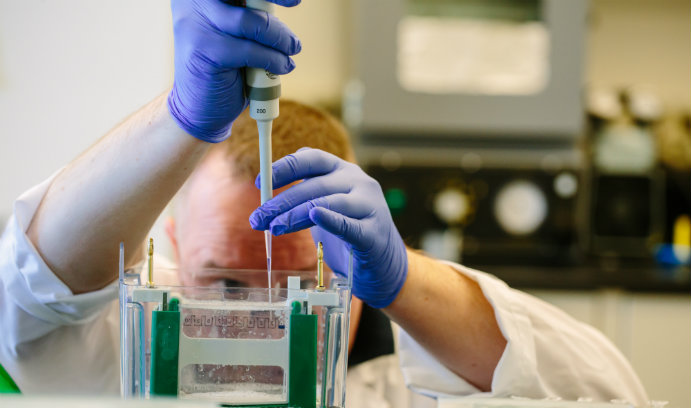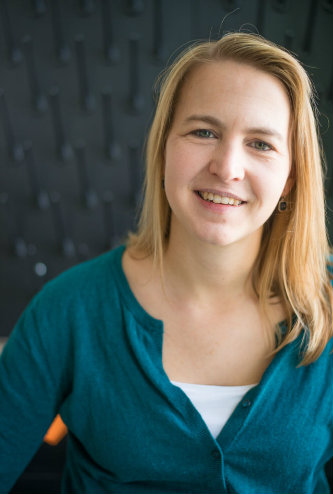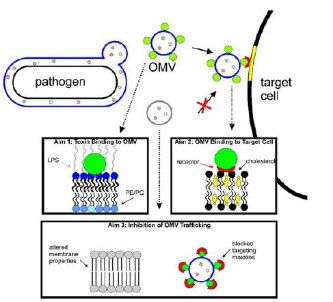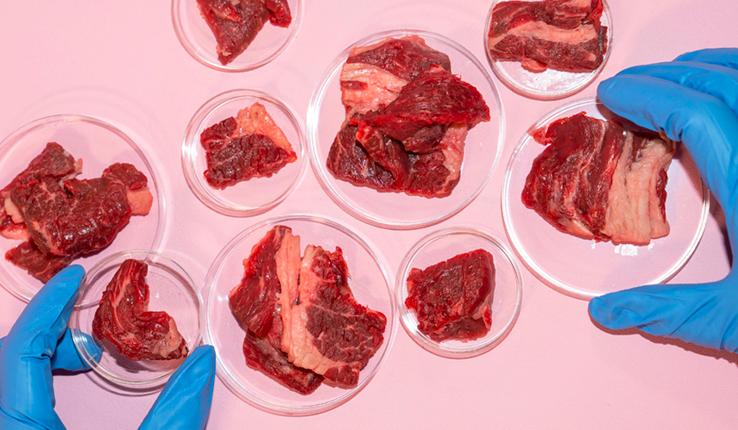Researcher pioneers unique approach to fighting bacteria

Researcher pioneers bacterial infection treatment using novel target: vesicles. Above is assistant professor Angela Brown's lab in the Health Research Hub in Iacocca Hall. Photo by Christa Neu
Bacterial infection takes hold in the body when a pathogenic microorganism delivers toxins to healthy cells. One way bacteria accomplish this is by releasing vesicles, which act as tiny envelopes transporting toxins and other virulence factors to host cells. These toxins allow the bacteria to “make themselves at home” in cells.
In the search for alternatives to antibiotics, researchers are exploring untraditional infection treatments that focus on these virulence factors as prime targets.
Angela Brown, assistant professor of chemical and biomolecular engineering at Lehigh, describes the alternative route this way: “Instead of killing bacteria, we make them really uncomfortable, giving the immune system time to mount a strong response.”
Working in her independent lab at Lehigh, Brown is pioneering a unique approach that, unlike previous methods targeting virulence factors, has the potential to apply to a broad range of pathogens. She and her team are focused on a novel target: outer membrane vesicles—which are regularly shed by Gram negative bacteria, among the most challenging type of bacteria to treat.
Her work has caught the attention of the National Science Foundation, which recently awarded her an NSF CAREER grant to fund the development of this transformative approach. The prestigious $500,000 grant supports untenured faculty pursuing solutions to major challenges through research and teaching.
During the five-year grant period, Brown and her team will seek to identify shared delivery mechanisms common among Gram negative bacteria in order to develop broad-range antibacterial molecules that will radically change the way the medical practitioners fight pathogenic bacteria.
In addition, Brown plans extensive outreach activities to help improve antibiotic stewardship by teaching the dangers of antibiotic misuse to K-12 students. She will also develop new courses at Lehigh and provide undergraduate and graduate research opportunities that encourage young women to choose STEM majors and pursue related technical careers.
Making bacteria an unwelcome guest
Both the United States Centers for Disease Control and Prevention (CDC) and the World Health Organization (WHO) have identified antibiotic resistance as a significant health threat. The CDC estimates that more than two million people develop antibiotic resistant infections annually in the United States, with more than 23,000 dying as a result.
Brown’s work addresses the urgent need to develop new antibiotic strategies. She will begin by systematically characterizing the toxin association of outer membrane vesicles—building on her previous work which confirmed that the composition of bacteria’s outer membrane vesicles plays a significant role in the toxin’s ability to bind with the vesicle.
Brown and her team will identify the specific lipid components and membrane properties that facilitate the binding of toxins to the vesicle and then investigate the role of those toxins in the vesicles’ ability to deliver vesicles to a healthy cell.
The third and final goal of the project will be to inhibit a toxin’s ability to associate with the outer membrane vesicle surface and block it from binding with a host cell—treating the bacteria like an unwelcome guest.
For the past seven years, Brown has been working with a bacterial leukotoxin (LtxA), produced by the oral pathogen Aggregatibacter actinomycetemcomitans. This toxin has been demonstrated to be enriched in the outer membrane vesicles produced by A. actinomycetemcomitans. She plans to build on the preliminary evidence she has collected—some of which were published recently in Molecular Oral Microbiology—to investigate her hypothesis generally using three representative organisms to identify shared mechanisms that could be used as targets for the development of broad-range treatment options.
Facilitating long-term STEM careers
In addition to research goals, Brown’s project seeks to address urgent challenges the country faces related to training an adaptable STEM workforce and improving the numbers of females entering and remaining in the STEM workforce.
As more women become primary earners for their families, STEM careers become particularly important to our country’s economic health. Women in STEM careers earn on average 30 percent more than women in non-STEM careers. Although the numbers of women and underrepresented minorities pursuing STEM careers has increased over the past four decades, problems, particularly in the “pipeline” remain. For example, a recent ASEE report showed that in 2014, women earned approximately 30 percent of all Chemical Engineering degrees (at the B.S., M.S., and Ph.D. levels) in the United States. However, the United States Department of Labor reported in 2009 that only 13.1 percent of employed chemical engineers in the previous year were female.
Brown aims to contribute to the solution by increasing the number of female chemical engineering degrees (to closer to 50 percent) and facilitating the long-term STEM careers of engineering graduates by helping her students see the broader impact of their studies and their research.
She is also committed to employing female and underrepresented minority students, both undergraduate and graduate, in her lab.
Brown joined Lehigh’s Department of Chemical and Biomolecular Engineering in January 2014 after a postdoctoral appointment at the University of Pennsylvania in the School of Dental Medicine. At Lehigh she has been honored with a P.C. Rossin Professorship, awarded to young faculty members who show significant career potential and a proven ability to reach out to other disciplines.
Posted on:






